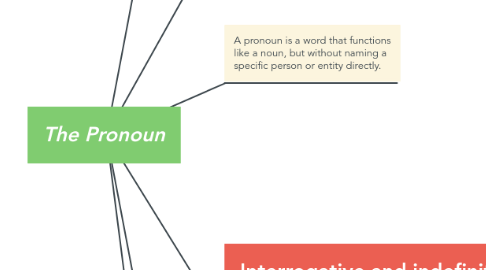
1. Personal pronoun
1.1. 1* Person
1.1.1. I
1.1.1.1. We use I and me to refer to the speaker or writer
1.1.2. We
1.1.2.1. I + one or more other persons
1.1.2.1.1. Inclusive we
1.1.2.1.2. Exlusive we
1.1.3. Us
1.1.3.1. Inclusive us
1.1.3.1.1. It means all of us.
1.1.3.2. Exclusive us
1.1.3.2.1. Making emphasis in “us” to mean we not you.
1.2. 2* Person
1.2.1. You
1.2.1.1. We use you to refer to the listener or reader.
1.3. 3* Person
1.3.1. Can refer as gender-neutral pronouns
1.3.1.1. They
1.3.1.1.1. Every adult human being has a right to decide what shall be done with their own body.
1.3.1.2. He/She
1.3.1.2.1. Every adult human being has a right to decide what shall be done with his own body.
1.3.2. It
1.3.2.1. We commonly use the pronoun it as both a subject and an object pronoun:
1.3.2.2. We often use it in question tags
1.3.2.3. We use it to refer to things
1.3.2.4. We usually use it to refer to countries, vehicles and machines.
2. Reflexive pronoun
2.1. Reflexive pronouns are myself, yourself, himself, herself, itself, ourselves, yourselves and themselves..
2.1.1. use
2.1.1.1. when the subject and the object of a verb are the same.
2.1.1.2. to add enphasis
2.1.1.2.1. when it's unusual or different.
2.1.1.2.2. that someone does it personally, not anybody else.
2.1.1.2.3. ogether with the noun it refers to in order to emphasise it.
2.1.1.3. By + reflexive pronoun
2.1.1.3.1. We can use by + reflexive pronoun to mean alone.
3. A pronoun is a word that functions like a noun, but without naming a specific person or entity directly.
4. Interrogative and indefinite pronouns
4.1. indefinite pronoun
4.1.1. they do not refer to any person or thing already mentioned in their context.
4.1.1.1. someone
4.1.1.1.1. This morning someone left the front door open.
4.1.1.2. anyone
4.1.1.2.1. Is anyone listening?
4.1.1.3. anything
4.1.1.3.1. Make sure you are not leaving anything behind.
4.2. Interrogative pronoun
4.2.1. An interrogative pronoun is one used to ask questions.
4.2.1.1. Who
4.2.1.1.1. Who left the door open?
4.2.1.2. What
4.2.1.2.1. What are you talking about?
4.2.1.3. Where
4.2.1.3.1. Where are my keys?
4.2.1.4. When
4.2.1.4.1. When are we supposed to arrive at Camila's house?
4.2.1.5. Why
4.2.1.5.1. Why did we agree to learn Greek?
4.2.1.6. Who
4.2.1.6.1. How do you learn so quickly?
5. Demonstrative pronoun
5.1. Singular
5.1.1. This
5.1.2. That
5.2. pronouns to point to people and things
5.2.1. Exist
5.2.1.1. Plural
5.2.1.1.1. These
5.2.1.1.2. Those
5.2.2. Uses
5.2.2.1. refer to people
5.2.2.1.1. add pronominal form
5.2.2.1.2. Types
5.2.2.2. Reference
5.2.2.2.1. When we don't want to repeat the word
6. Substitute one / ones
6.1. We use one/ones instead of repeating a countable noun
6.1.1. Singular
6.1.1.1. one
6.1.2. Plural
6.1.2.1. ones
